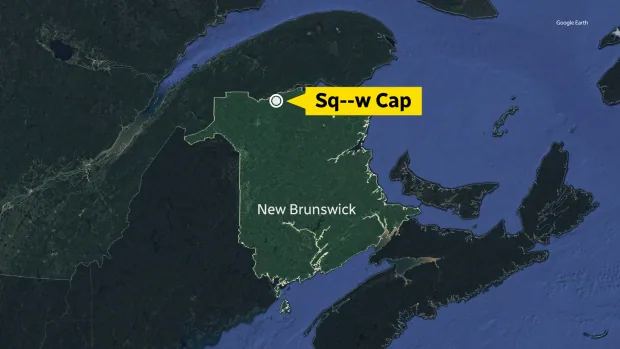The U.S. Department of the Interior is moving to replace the use of an Indigenous slur in more than 660 place names, but the word remains in use for 20 locations in Canada.

WARNING: This article discusses an offensive slur. CBC has chosen to use it once for context and censor it in later references.
The U.S. Department of the Interior is looking to replace the names of more than 660 geographical locations across the country that use the derogatory word “squaw” in their titles.
This week, the department announced potential replacement names for the locations that use the term that it officially deemed derogatory late last year.
A federal task force in the United States was created to help rename all of the locations using the offensive word. It has also replaced it in its communications with “Sq—.”
In Canada, there are 20 official names with the word still in use in a government database of geographical names, seven of which are in New Brunswick.
Kyana Kingbird, a Mi’kmaw and Ojibway woman from Esgenoôpetitj (Burnt Church) First Nation in New Brunswick, said she was surprised to hear that her home province has the highest number of locations with the term in its name.

Although she has not encountered any of the official place names, Kingbird said she knows the harm that hearing or seeing the word can do, and grew up knowing it as a racial term.
The first time she heard the word directed at her, she was in the drive-thru at a local fast food restaurant a few years ago when a group of men in a car behind her were yelling “sq–w” and “did you pick up your welfare cheque?”
Kingbird said that incident stayed with her over the years, and she feels it is necessary for governments to act as a positive example and stop the use of derogatory terms.
“One thing I think is really essential when it comes to racially motivated words like this is having authority tell people it’s not OK to do this,” she said. “Society doesn’t change to reflect laws. Laws change to reflect society.”
Kingbird said she hopes she’ll see more action by leaders in charge.
“I think it’s important that … governments and authority make it clear that it’s not acceptable to use these words,” she says. “If they’re not saying it’s not acceptable to use them, then people can believe that it is acceptable.”

Last year in Yukon, campaigning political leaders supported the removal of four uses of “sq–w” in official place names in the region. Elders in Carcross/Tagish First Nation in Yukon have reclaimed one such place name on their lands, but all four are still listed on the government database.
Traditional Wolastoq Grand Chief Ron Tremblay in New Brunswick said the lack of progress in Canada compared to the United States in efforts to change offensive and colonial names is problematic.
“It clearly shows that systemic racism is still at the forefront in our province and in our country,” he said. “Be that as it may, I truly believe the colonial names and the whole process of renaming certain areas is such a farce, really for me.”
Tremblay said as a country we should not still be struggling to change something as minimal as a name.
“All it takes is the stroke of a few pens, really, and then being passed in legislature and being passed by a government who supports the changing of discriminatory names that belittle and oppress our people, especially the female gender.”
In a statement to CBC, the U.S. Department of the Interior said the list of more than 660 candidate replacement names is in tribal consultations. Five options for each location are up for public review. Recommendations will be submitted to the Board of Geographical Names, which oversees the naming process.
The board will vote on the changes later this year, the statement said.
“Words matter, particularly in our work to make our nation’s public lands and waters accessible and welcoming to people of all backgrounds,” U.S. Secretary of the Interior Deb Haaland said in a statement. “Consideration of these replacements is a big step forward in our efforts to remove derogatory terms whose expiration dates are long overdue.”
New Brunswick’s Department of Tourism, Heritage and Culture said in a statement to CBC that an evaluation process has been started to better address inclusivity, and a draft process has been shared with First Nations that also requests their input.
The department did not provide a timeline for when name changes would be completed.
The federal Department of Natural Resources, which oversees Canada’s official place names, did not respond to request for comment.

